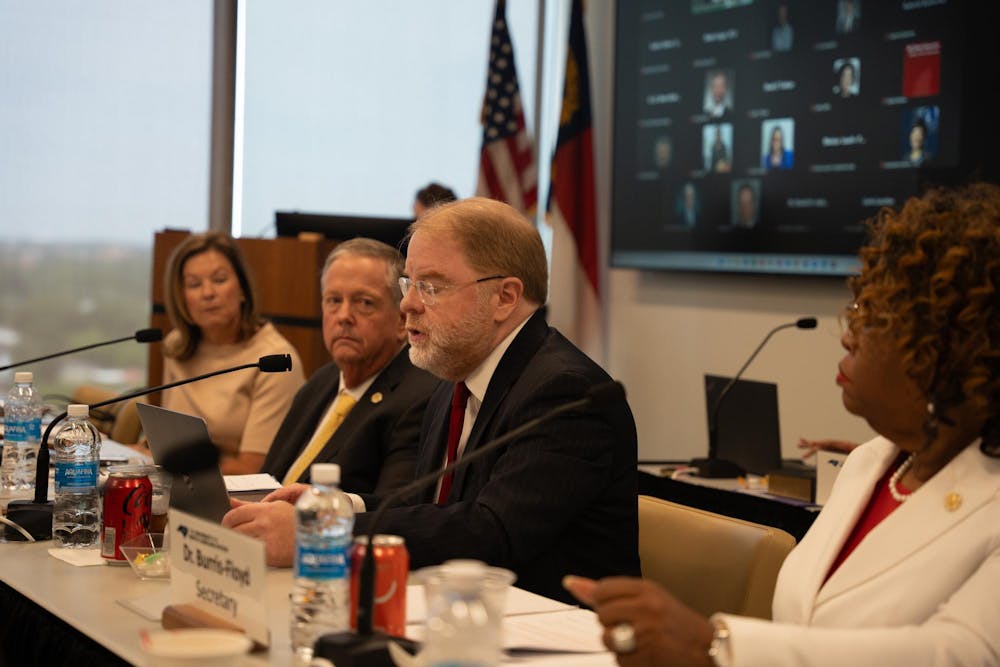Ramos said she and her co-director of DEI, Alexandra Versace, met with Provost Clemens in October to discuss compliance with institutional neutrality.
DEI-related Positions and Programs Impacted
Versace, who was selected to participate in the DEI Fellowship program this academic year, said she found out that the program no longer exists in a September meeting with her fellowship cohort.
“It was a program that I thought I would benefit really well from, and I was very interested to get to work in a position on campus and help solve DEI issues, as well as learn and build connections in that community since it’s so niche,” Versace said. “But unfortunately, that was unable to happen.”
Following the repeal, the University Diversity and Inclusion office no longer exists. Project Uplift, a program for high schoolers that introduces them to the University, now sits under the Office of Carolina Higher Education Opportunity Programs.
Identity-based centers including the Carolina Latinx Center, Sonja Haynes Stone Center and Asian American Center remain open.
In September, Ramos and Versace organized a DEI Town Hall to address students’ confusion about the policy changes. Leah Cox, former vice provost for equity and inclusion and the current vice provost for the office of the provost, attended the town hall and answered questions.
“I’m glad student government was able to kind of step in and play this role of, ‘here’s the information that you need, here’s how it will affect you, here are the resources that you will still have [and] here are the ones that unfortunately we’re losing,’” Ramos said.
‘Affirmative Action was a Bridge’
In September, UNC reported the statistics and demographics for the class of 2028 — the first class admitted since the U.S. Supreme Court repealed race-based affirmative action in 2023. The percentage of Black or African American identifying first-year and transfer students dropped about 25 percent.
Sarah Zhang, a UNC senior and founder and internal affairs chair of the Affirmative Action Coalition, said UNC’s Black student population was already not representative of the racial breakdown in North Carolina.
“But now it’s just like we just took a giant step back again, and we’re never really going to reach that equality level that some of us wanted to see,” Zhang said.
To get the day's news and headlines in your inbox each morning, sign up for our email newsletters.
Media Relations wrote that the changes to the undergraduate admissions process were handled by the Admissions Office.
Versace said she and Ramos met with Rachelle Feldman, the vice provost for enrollment, in October. In that meeting, Ramos pitched for UNC students to visit high schools in low income areas to encourage students to apply.
“Affirmative Action was a bridge in those gaps to higher education, right? So when you take away affirmative action, it’s taking away that bridge for a lot of different types of people,” Ramos said.
In a Sept. 18 BOT meeting, Feldman said there were issues with the Free Application for Federal Student Aid this year. She also said that one year of data does not determine a pattern.
Zhang said the AAC leadership team is working on a “disorientation guide” to distribute to the class of 2029.
“I don’t think the University administration is ever going to provide students with the resources to educate themselves about the University, just because they’re doing so much shady stuff,” Zhang said. “And especially for students of color, we want them to come in acknowledging that the University is not serving their best interests, and here are some ways they can do so.”
Zhang said the DEI repeal represents people who are out of touch with what students really want.
“I think it’s important that the student body is still very loud about how, you know, the narratives that you might hear about our school is not our school,” Ramos said. “We are still the Carolina that champions diversity, that champions inclusion [and] that champions equity.”
@dailytarheel | university@dailytarheel




